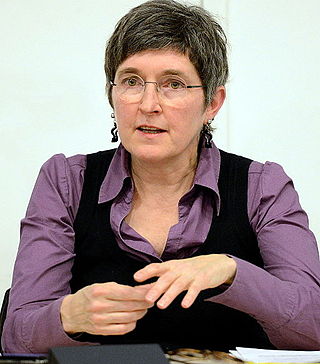
Luxembourg has participated in the Eurovision Song Contest 38 times since its debut at the first contest in 1956. The Luxembourgish national broadcaster, RTL Lëtzebuerg (RTL), participates in the contest representing the country. The nation participated in all but one event between 1956 and 1993, only missing the 1959 contest. After finishing among the bottom seven countries in 1993, Luxembourg was relegated and prevented from competing in 1994. The nation declined to return to the contest in 1995, and would make no further appearances over the next three decades. The country returned to the event for the first time in 31 years in 2024.
The 12 cantons of the Grand Duchy of Luxembourg are subdivisions at the first level of local administrative unit (LAU-1) in the European Union's Nomenclature of Territorial Units for Statistics for Eurostat purposes. They were subdivisions of the three districts of Luxembourg until 2015, when the district level of government was abolished. The cantons are in turn subdivided into 100 communes.

South is one of the four multi-member constituencies of the Chamber of Deputies, the national legislature of Luxembourg. The constituency was established in 1919 following the introduction of proportional representation for elections to the Chamber of Deputies. It consists of the cantons of Capellen and Esch-sur-Alzette. The constituency currently elects 23 of the 60 members of the Chamber of Deputies using the open party-list proportional representation electoral system. At the 2023 general election it had 111,884 registered electors.

North is one of the four multi-member constituencies of the Chamber of Deputies, the national legislature of Luxembourg. The constituency was established in 1919 following the introduction of proportional representation for elections to the Chamber of Deputies. It consists of the cantons of Clervaux, Diekirch, Redange, Vianden and Wiltz. The constituency currently elects nine of the 60 members of the Chamber of Deputies using the open party-list proportional representation electoral system. At the 2023 general election it had 52,922 registered electors.
Luxembourg was represented at the Eurovision Song Contest 1965 with the song "Poupée de cire, poupée de son", written by Serge Gainsbourg, and performed by French singer France Gall. The Luxembourgish participating broadcaster, the Compagnie Luxembourgeoise de Télédiffusion (CLT), selected its entry through a national final, after having previously selected the performer internally. The song went on to win the contest, bringing Luxembourg their second Eurovision victory.
The Maulkuerfgesetz was a proposed 1937 law in Luxembourg. Officially, it was entitled the "Law for the Defence of the Political and Social Order" but was nicknamed Maulkuerfgesetz by its opponents. The law would have allowed the Luxembourgish government to ban the Communist Party and dissolve any political organisation which they believed might endanger the constitutional institutions. The members of these parties or organisations would be stripped of their political offices and could not be employed by the state or by local governments.
Emile Haag is a Luxembourgish historian, trade unionist and former principal of the Athénée de Luxembourg. From 1987 to 2016 he was the president of the General Confederation of Civil Servants, a Luxembourgish trade union. In 1997, he was made commander of the Ordre de la couronne de chêne. Between 2005 and 2015 he was also President of the Chamber for Civil Servants and Government Employees. In 2015 he was made honorary president of that chamber.

Renée Wagener is a Luxembourgish journalist, sociologist, historian, and former politician. She served for 10 years in the Chamber of Deputies as a member of The Greens.
Partial general elections were held in Luxembourg on 13 and 20 June 1899, electing 21 out of 48 members of the Chamber of Deputies.
Partial general elections were held in Luxembourg on 9 and 16 June 1896, electing 24 members of the Chamber of Deputies. The elections took place in Echternach, Esch-sur-Alzette, Luxembourg-Campagne, Mersch, Remich, and Wiltz.
Partial general elections were held in Luxembourg on 13 and 20 June 1893, electing 20 members of the Chamber of Deputies. The elections took place in Capellen, Clervaux, Diekirch, Grevenmacher, Luxembourg-Ville, Redange and Vianden.
Partial general elections were held in Luxembourg on 10 June 1893, electing members of the Chamber of Deputies. The elections took place in Echternach, Esch-sur-Alzette, Luxembourg-Campagne, Mersch, Remich, and Wiltz.
Partial general elections were held in Luxembourg on 14 June 1887, electing 21 members of the Chamber of Deputies. The elections took place in Capellen, Clervaux, Diekirch, Esch-sur-Alzette, Grevenmacher, Luxembourg-Ville, Redange, and Vianden.
Partial general elections were held in Luxembourg on Thursday 17 September 1857, electing members of the Assembly of Estates.
Partial general elections were held in Luxembourg on Tuesday 10 June 1884, electing members of the Chamber of Deputies. The elections took place in Echternach, Esch-sur-Alzette, Luxembourg-Campagne, Mersch, Remich, and Wiltz.
Partial general elections were held in Luxembourg on 11 June 1878, electing members of the Chamber of Deputies. The elections took place in Echternach, Esch-sur-Alzette, Luxembourg-Campagne, Mersch, Remich, and Wiltz.
Partial general elections were held in Luxembourg on 9 June 1875, electing members of the Chamber of Deputies. The elections took place in Capellen, Clervaux, Diekirch, Grevenmacher, Luxembourg City, Redange, and Vianden.
Partial general elections were held in Luxembourg on 11 June 1872, electing members of the Chamber of Deputies. The elections took place in Echternach, Esch-sur-Alzette, Luxembourg-Campagne, Mersch, Remich, and Wiltz.
Partial general elections were held in Luxembourg on 8 June 1869, electing 20 members of the Chamber of Deputies. The elections took place in Capellen, Clervaux, Diekirch, Grevenmacher, Luxembourg City, Redange, and Vianden.
Partial general elections were held in Luxembourg on 9 June 1863, electing members of the Assembly of Estates. The elections took place in Luxembourg-City, Capellen, Diekirch, Grevenmacher, Redange, Clervaux, and Vianden.




